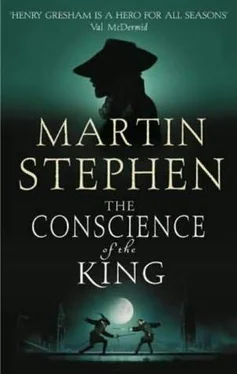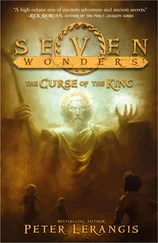Martin Stephen - The Conscience of the King
Здесь есть возможность читать онлайн «Martin Stephen - The Conscience of the King» весь текст электронной книги совершенно бесплатно (целиком полную версию без сокращений). В некоторых случаях можно слушать аудио, скачать через торрент в формате fb2 и присутствует краткое содержание. Жанр: Исторический детектив, на английском языке. Описание произведения, (предисловие) а так же отзывы посетителей доступны на портале библиотеки ЛибКат.
- Название:The Conscience of the King
- Автор:
- Жанр:
- Год:неизвестен
- ISBN:нет данных
- Рейтинг книги:4 / 5. Голосов: 1
-
Избранное:Добавить в избранное
- Отзывы:
-
Ваша оценка:
- 80
- 1
- 2
- 3
- 4
- 5
The Conscience of the King: краткое содержание, описание и аннотация
Предлагаем к чтению аннотацию, описание, краткое содержание или предисловие (зависит от того, что написал сам автор книги «The Conscience of the King»). Если вы не нашли необходимую информацию о книге — напишите в комментариях, мы постараемся отыскать её.
The Conscience of the King — читать онлайн бесплатно полную книгу (весь текст) целиком
Ниже представлен текст книги, разбитый по страницам. Система сохранения места последней прочитанной страницы, позволяет с удобством читать онлайн бесплатно книгу «The Conscience of the King», без необходимости каждый раз заново искать на чём Вы остановились. Поставьте закладку, и сможете в любой момент перейти на страницу, на которой закончили чтение.
Интервал:
Закладка:
He had actually started to stand up, on his way to taking the box back to the desk, when something made him stop.
Its catalogue designation stated that it contained unpublished papers relating to sermons planned by the late bishop. Unpromising material, essentially. Lancelot Andrewes had written clearly, fluently and with a commendable sense of discipline. Papers he had discarded as being worth little were likely to be just that, minor memorabilia of no use to someone trying to research the features of a great life. But the new preservation techniques they had applied to these papers were quite extraordinary. The injection process — or was it more properly a process of osmosis? — protected the manuscripts from heat and light depradation, but also meant they could lie on top of each other and be handled by greasy fingers, all the while with an invisible barrier between them and the handler. It also preserved their natural colour. Which was why his attention was drawn to the box. A corner of paper protruded from it. Its colour was different to all die others he had been looking at. More eighteenth-century than seventeenth. He sat back down again, heavily, more tired and dispirited than he cared to admit. Why not untie the box? If at the end of the day he could tell the library they had misfiled a bit of paper, at least he would have achieved something.
It was a folder, he saw, the clumsy eighteenth-century version of a modern wallet file. It had been catalogued with the GRESH prefix. Any historian from the late sixteenth-century onwards knew that was the code for the Gresham family. This was obviously something dating from the first serious attempt to catalogue the vast
Gresham papers, started around the 1780s but which sadly showed huge goodwill but little academic rigour. This particular folder had clearly been part of the Gresham collection, but at some stage had been transferred to the Andrewes papers. Interesting, he thought, his brain starting to engage again. A librarian walked heavily past him, sighing. He decided to ignore it. He opened the wallet.
There! The familiar look and feel of the paper Andrewes liked to use, flowing writing in the hand he had now come to see after three years of research as almost the same as his own. Then one final clutch of papers in a different hand, different paper. That could wait. He turned over the first document in Andrewes's hand.
The code! Andrewes had used a simple code for some of his letters, normally when in correspondence with his friend Francis Bacon and he had the need to say something vaguely scurrilous about a clergyman or courtier of their mutual acquaintance. A clever eighteenth-century librarian had spotted the code and who it belonged to, without having the key to translate it. With the marvellous freedom they had had in those days, the librarian had transferred the papers from GRESH to ANDREWE in the hope that someone else would make sense of them.
Despite this effort, it was probably nothing; just more gossip. Yet something made him take the table from his own file and convert the code to English. There was a heading, first of all. A librarian stopped by his work station and noisily began to gather up books, papers and boxes. He ignored him.
To My Lord Henry Gresham, First Baron Granville and Friend to My Heart
I am dying, my friend, and will shortly find if the Maker in whom I believe with all my heart and soul will pass good judgement on my life…
He could hardly believe what he was reading! The undiscovered last will and testament of the great man himself. Written to one of the most notorious figures of the age. A librarian could have exploded by his side and he would not have noticed. His eyes flickered from the original to the key, his hand starting to shake uncontrollably as it grasped the cheap biro and transcribed the code on to the thin, cheap-ruled paper, far, far too slowly for the pressure of his mind.
… you preserved my reputation, and perhaps even my soul, when by your action you took my plays from me and gave them instead to William Shakespeare. I now concede what I found it hard to concede before. They were always his, for all that my vanity sought to persuade me that they were mine…
William Shakespeare? He ran the code again. Shakespeare. William Shakespeare. Plays? Plays written by the man credited with a great part of the King James Bible? He was set to move on, translate more, but his eye was caught by the bottom paper in the box. Different, cheaper paper. A closer hand. Paper was expensive in those days. All except bishops and the mightiest of lords wrote close and hard together on such a valuable commodity.
Most Gracious and Honoured Lord,
The honour done to me by the trust of your most recent package knows no bounds, as my admiration of the skill you bring to this most noble art knows no bounds. For this humble spinner of words to offer more than thanks is in itself an insult. It is therefore in a spirit of submission, regard and humility that I seek to question as I do, in the belief that even the noblest of buildings needs the humble mason to see to its design. It is in this spirit that I ask first of all if to call this work The Magic of Man is sufficient testimony to its true brilliance and worth, where a proper description of its power is that it unleashes a tempest of thought and a tempest of wonders into die mind of its audience…
The letter was five pages long. As he moved to continue the translation, his hand skewed the other sheets up, revealing the last page. The signature.
William Shakespeare.
For a moment, the world stopped. Then, slowly, colour, light and sound returned to it, though it was as if the pounding of his heart would never cease.
A librarian was standing by his side. 'I'm sorry, sir, but we're closing now. If I could ask you…'
He looked up at the man and pointed to the end sheet. He gathered up the five sheets as if they were the souls of his two children, held them up as an offering to the librarian.
'A letter,' he said simply. 'A five-page letter by William Shakespeare. Hitherto Unknown,' he added.
The librarian looked at him. Something in the moment had caught him, caught them both. Suddenly the librarian felt, knew even, that this was a moment that would be replayed time after time after time, replayed for as long as there were humans who cared about art.
'Not a will, or a legal document, or something about his second-best bed,' he said to the librarian. 'A five-page letter. A letter which seems to go into intimate detail about the authorship of Shakespeare's plays. A letter,' he added for good measure, 'which was found in the archive material of The Cambridge University Library.'
'A letter by… Shakespeare?' said the librarian in a reverential tone.
'Do you think,' he said, plucking up his courage, 'that just this once you could ask someone if the library could stay open a little longer?'
He saw little of what the future held for him as he proffered the five pages that had lain unseen for so long up to the lowly library employee. The fame, the notoriety, the divorce, the resentment of his children, the abuse and, finally, in his old age, the post as
Chaplain of Granville College, where he spent most of the day and night in his rooms, followed by the whispers of the tourists on the rare days when he faced the college quad.
Yet even then his heart told him something. Every book written about Shakespeare, or with even a passing reference to him, redundant now. Every film, every play and every parody — redundant now. The huge, vast and magnificent edifice of Shakespearian scholarship, its pontificating secular bishops, demolished, empty and meaningless. A hundred thousand voices who had sneered at their opponents over four hundred years that of course Shakespeare was, had to be, the only author of his plays, redundant now. A hundred thousand voices who had joined together in societies, campaigned, lobbied and sometimes sneered that of course Shakespeare could not have been the author of the plays credited to him, that they were written by Oxford, Marlowe, Rutland, Derby, all redundant now.
Читать дальшеИнтервал:
Закладка:
Похожие книги на «The Conscience of the King»
Представляем Вашему вниманию похожие книги на «The Conscience of the King» списком для выбора. Мы отобрали схожую по названию и смыслу литературу в надежде предоставить читателям больше вариантов отыскать новые, интересные, ещё непрочитанные произведения.
Обсуждение, отзывы о книге «The Conscience of the King» и просто собственные мнения читателей. Оставьте ваши комментарии, напишите, что Вы думаете о произведении, его смысле или главных героях. Укажите что конкретно понравилось, а что нет, и почему Вы так считаете.












